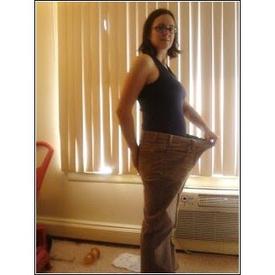No Foods?
Options

Mdin1029
Posts: 456 Member
How do you all feel about the foods listed in Jillian's meal plan book as "No Foods"? I was shocked to see that she suggests NEVER eating:
peanuts
raw broccoli
straweberries
soy
and flax
I'm not planning on following her meal plan 100% but was goint to follow the tips. I know she said they MAY effect the thyroid gland but don't straweberries in particular have so many benefits that would outweigh that? What do you guys think?
peanuts
raw broccoli
straweberries
soy
and flax
I'm not planning on following her meal plan 100% but was goint to follow the tips. I know she said they MAY effect the thyroid gland but don't straweberries in particular have so many benefits that would outweigh that? What do you guys think?
0
Replies
-
I Was so dissapointed by the strawberrys im going to try to live without them. but maybe treat myself sometimes. im doing the same not following her meals but taking tips and just eatting all around healthy and a 1100-1200 call a day diet as her daily meal plains seem to come out to.
i can tell you i made her cheff salad which is in the kick start guide i replace the tuna with Chicken or ham, its AMAZING! I think i just might be having that for lunch for a while 0
0 -
I just received mine today and was surprised to read that, too. I do not plan to exclude strawberries, but I do not plan to have them everyday. I think those foods would only have an impact on the thyroid when eaten in bulk. Those are my thoughts...0
-
I just received mine today and was surprised to read that, too. I do not plan to exclude strawberries, but I do not plan to have them everyday. I think those foods would only have an impact on the thyroid when eaten in bulk. Those are my thoughts...
That makes sense, I have been having berries almost everyday for a while now, I guess I'll finish the strawberries I just bought and then wait till summer when they taste better anyway. Might switch from peanutbutter to almond butter as well. Soy will be hard due to my love of sushi, plus my Kashi Go Lean Crunch has soy protein. I have heard too much soy is not good anyway, so will try to cut down.
Thanks for the feedback 0
0 -
I was really surprised by the "No Foods" too. I want to do some more research on it because I had never heard that they could be bad for thyroid function. Really interesting. I don't eat those things anyway. lol. Well I do eat peanuts but not often and I don't eat raw broccoli or the other stuff.0
-
I was really surprised by the "no foods" as well. I'm hypothyroid and have to be on daily medication. My dr has never mentioned anything to me about strawberries, peanuts or any of the other foods.
I have to have at least 1/2 cup of strawberries on my greek yogurt for breakfast. I cut back from 1 cup to 1/2 cup and I feel like that was a big enough sacrifice....LOL!
I can switch from peanut butter to almond butter without a problem, though.0 -
Did some research and here's what I found from a healthy foods non-profit organization's site. The concern with the "no foods" as they relate to thyroid function involve what are called "goitrogens." Here's what I found:
Goitrogens are naturally-occurring substances that can interfere with function of the thyroid gland. Goitrogens get their name from the term "goiter," which means an enlargement of the thyroid gland. If the thyroid gland is having difficulty making thyroid hormone, it may enlarge as a way of trying to compensate for this inadequate hormone production. "Goitrogens," like circumstances that cause goiter, cause difficulty for the thyroid in making its hormone.
Foods that contain goitrogens:
Broccoli
Brussel sprouts
Cabbage
Cauliflower
Kale
Kohlrabi
Mustard
Rutabaga
Turnips
Millet
Peaches
Peanuts
Radishes
Soybean and soy products, including tofu
Spinach
Strawberries
In the absence of thyroid problems, there is no research evidence to suggest that goitrogenic foods will negatively impact your health. In fact, the opposite is true: soy foods and cruciferous vegetables have unique nutritional value, and intake of these foods has been associated with decreased risk of disease in many research studies.
Because carefully controlled research studies have yet to take place on the relationship between goitrogenic foods and thyroid hormone deficiency, healthcare practitioners differ greatly on their perspectives as to whether a person who has thyroid problems, and notably a thyroid hormone deficiency, should limit their intake of goitrogenic foods. A standard, one cup serving of cruciferous vegetables 2-3 times per week, and a standard, 4-ounce serving of tofu twice a week is likely to be tolerated by many individuals with thyroid hormone deficiency.
Although research studies are limited in this area, cooking does appear to help inactivate the goitrogenic compounds found in food. Both isoflavones (found in soy foods) and isothiocyanates (found in cruciferous vegetables) appear to be heat-sensitive, and cooking appears to lower the availability of these substances. In the case of isothiocyanates in cruciferous vegetables like broccoli, as much as one third of this goitrogenic substance may be deactivated when broccoli is boiled in water.0 -
Did some research and here's what I found from a healthy foods non-profit organization's site. The concern with the "no foods" as they relate to thyroid function involve what are called "goitrogens." Here's what I found:
Goitrogens are naturally-occurring substances that can interfere with function of the thyroid gland. Goitrogens get their name from the term "goiter," which means an enlargement of the thyroid gland. If the thyroid gland is having difficulty making thyroid hormone, it may enlarge as a way of trying to compensate for this inadequate hormone production. "Goitrogens," like circumstances that cause goiter, cause difficulty for the thyroid in making its hormone.
In the absence of thyroid problems, there is no research evidence to suggest that goitrogenic foods will negatively impact your health. In fact, the opposite is true: soy foods and cruciferous vegetables have unique nutritional value, and intake of these foods has been associated with decreased risk of disease in many research studies.
Because carefully controlled research studies have yet to take place on the relationship between goitrogenic foods and thyroid hormone deficiency, healthcare practitioners differ greatly on their perspectives as to whether a person who has thyroid problems, and notably a thyroid hormone deficiency, should limit their intake of goitrogenic foods. A standard, one cup serving of cruciferous vegetables 2-3 times per week, and a standard, 4-ounce serving of tofu twice a week is likely to be tolerated by many individuals with thyroid hormone deficiency.
Thanks for the research! This is exactly the part I was thinknig of "In the absence of thyroid problems, there is no research evidence to suggest that goitrogenic foods will negatively impact your health. In fact, the opposite is true" I love Jillian but why is assuming all of us have a thyroid issue? And even if we do, it says that it CAN interfere with function of the thyroid gland, not that is DOES interfere.
Anyway, the workouts are great 0
0 -
Why is flax on her NO list?0
-
Almond butter at my local store was over $11 for a small jar. I won't be having that.0
-
Almond butter at my local store was over $11 for a small jar. I won't be having that.
Roander,
Do you have a Trader Joe's near you? Even at Whole Foods, you can find almond butter for less than $5...0 -
Trader Joe's has the BEST almond butter!! And I think it's under $4.00.0
-
I was also surprised to read about the "no foods". I have an enlarged thyroid and get an ultrasound every 6 months or so. All my T levels are fine, but I am monitoring the size and/or growth of the thyroid. My doctors/endocrinologist never mentioned "no foods" before so I am going to ask this month when I go in to see how she feels about it.
I'm a HUGEEEE raw vegetable eater, esp broccoli and strawberries. I do consume alot of peanut/products so I'm trying to wean myself off for a little bit to see if that makes a difference.0 -
Why is flax on her NO list?
The lignans in flax apparently bind to testosterone in the blood stream. Jillian thinks this is a negative.
I can't find much research that actually correlates negative health risks with eating flax.
t.0 -
Why is flax on her NO list?
The lignans in flax apparently bind to testosterone in the blood stream. Jillian thinks this is a negative.
I can't find much research that actually correlates negative health risks with eating flax.
t.
Thanks! I can't really find anything negative about flax at all.0
This discussion has been closed.






